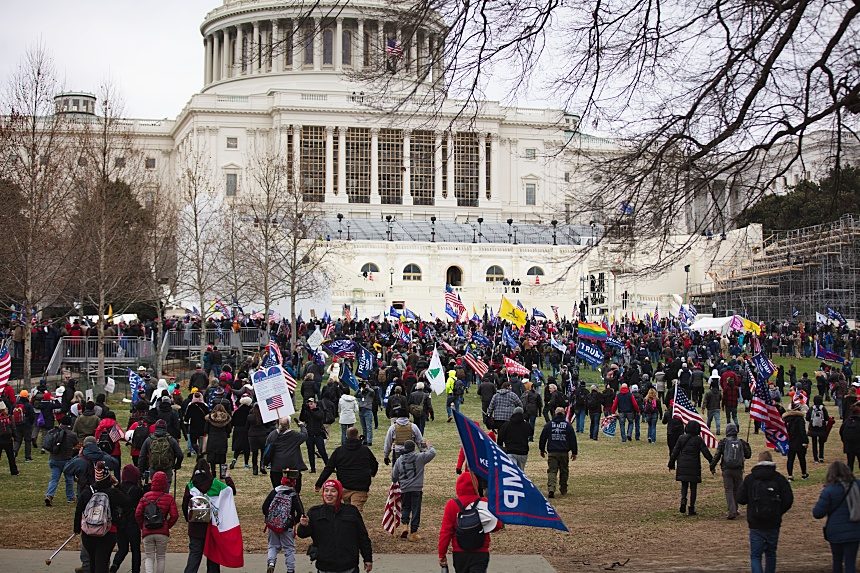At the “Save America” rally that took place in Washington, D.C. on January 6, 2021, President Trump, several members of Congress, and other Trump supporters made speeches before a crowd protesting the results of the election. The protesters then stormed the U.S. Capitol.
The question being asked now is did any of the remarks of the president and his associates constitute insurrection? Did they break the law? The answer depends on the interpretation of several court decisions, possibly including a little known piece of legislation that was passed 80 years ago: The Smith Act.
In 1919, the Supreme Court decided there was no Constitutional right to speech that posed a clear and present danger to the public. For decades, “clear and present danger” was the standard against which all extreme speech was measured.
Then, in 1940, the definition of prohibited speech was broadened by the little remembered Smith Act. Officially named The Alien Registration Act, it made it a crime for anyone who “advocates, abets, advises, or teaches the duty, necessity, desirability, or propriety of overthrowing or destroying the government of the United States.” It was principally intended to prevent German, Japanese, or Russian agents from creating unrest in America.
The law required all non-citizens applying for visas to state their background and purpose of stay and submit to being fingerprinted. Nearly three million people registered under this law, and when America entered World War II, federal authorities used their information to take over 2,900 people into custody.
Eventually the war ended, but Smith Act prosecutions didn’t. It enabled the federal government to deport immigrants who were suspected of being communists. The Supreme Court upheld this use of the law in their 1951 ruling, Dennis v. United States.
Michael Montgomery, who is a political science lecturer at The University of Michigan-Dearborn, says, “The Court interpreted the ‘clear and present danger’ standard as permitting the conviction of Communist Party leaders based on their abstract desire to see an overthrow of the government at some unspecified point in the future (but without any overtly revolutionary acts).”
Over time, the Court seemed to recognize that such prosecutions encroached on the right of free speech. Their 1961 decision in Noto v. United States, says Montgomery, “narrowed the Act’s application greatly – to those participating actively in groups advocating the overthrow of the U.S. government in specific as opposed to abstract ways.”
An even greater limit came out of the 1969 Brandenburg v. Ohio decision, which established what is known as the Brandenburg Test. Now, instead of posing the open-for-interpretation standard of “clear and present danger,” speech would be prohibited if it (1) intended to provoke imminent illegal action and (2) was likely to occur.
While it is possible that some of the recently made threats against the government could have been prosecuted under the Smith Act, these subsequent decisions have set the bar much higher for insurrection.
“The Smith Act is anomalous,” says business law Professor Nicholas Creel at Georgia College and State University. “It was legislation of its time, when the country was worried some internal uprising would take us down.”
Creel says that the courts today would use the more modern standard of prohibited speech. “Calling on others to engage in overthrowing the government is something you’re allowed to do under the Brandenburg standard — as long as it isn’t an imminent overthrow and it isn’t likely to happen.”
Under this standard, Creel says, what was said by public figures on January 6 would not qualify for prosecution. “If you look at the speeches and tweets of that day, they’re all so vague — even the call to ‘fight like hell.’ Imagine if we criminalized every politician who says you have to fight. Politics is known for hyperbolic rhetoric.”
But Creel adds that just because statements made at the January 6 rally don’t meet the Brandenburg standard doesn’t mean they aren’t harmful to the republic, or pose a threat to elected officials. “There could be an argument for not changing the standard [for prosecution] but adding to it, changing the application. We need to address how far we allow people go in planning something before we take action. We have to really give it some thought. The [January 6] insurrection is a great chance to do that.”
Featured image: Shutterstock
Become a Saturday Evening Post member and enjoy unlimited access. Subscribe now



